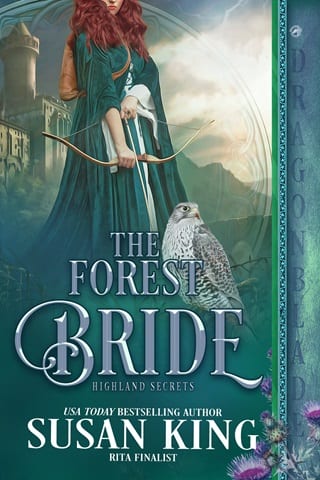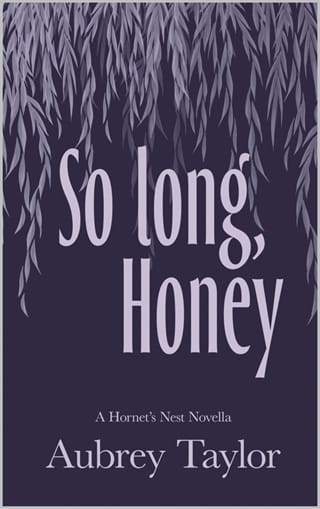Chapter Seven
D uncan strolled across the bailey yard, cheese in hand—reminding himself to ask Euphemia if she could make some decent meals while she was here—and looked around at the castle in the blue twilight. Somehow its features and flaws showed fresh in the light. Trotting beside him, one of the tall hounds gave a low woof.
"I know, Mungo," Duncan murmured. "Look at this place. Stout and strong once, aye, and we have done some work. But there is more to do."
Several years ago, while he had still been in Ireland, the English had ridden north and had attacked the small garrison his brother had assigned to Brechlinn, setting it on fire and bringing part of it to rubble. Since his return, Duncan had done what he could to repair it, but there was work to do yet.
"The outer wall is still broken just there," he told the dog, "and the ivy is higher than ever. The smithy is in disuse, even with the new anvil we put in. We do not have a smith. Still, it is a good fortress, if sparse and broken in places. We can make something of it someday. What do you think, hey?"
The leggy hound gave a soft woof, and Duncan huffed agreement. "Not much of a home, but I do not need much just now. A place to rest and somewhere for hounds and hawks. And friends. That is enough, hey." He rubbed the dog's head.
Along the curtain wall, ivy climbed the stone like dark fingers, and on the battlement just two guards strolled. The yard was nearly empty but for a cart—the brewer, Bran's good friend, must be here again, he realized—along with some barrels and stacks of hay, a broken wheel and other remnants in stone and wood of the place it had once been and could be again. Everywhere, inside and out, needed attention. Brechlinn Castle needed new life. Its laird did too.
Later for that. Always later, he told himself sourly, but for the birds. His priorities were the birds and other secrets he kept.
Mungo woofed, and Duncan saw Bran MacArthur lumbering through the shadowed yard. He hailed his seneschal and stopped to wait.
"How did things go?" he asked.
"Good. We brought food to the lad and set up a bath. Effie is up there. She is happy to mother anyone. The bairn says his injury is naught and a hot soak will do."
"When Effie leaves, ask Hector to sit outside the door until midnight, and set Artan there the rest of the night. Give them blankets but tell them to be alert to movement. And I want a man watching the tower, and two more watching the gate."
"That slip of a lad will not go out the window. It is a far drop and he has no rope."
"Still, we will watch the door and the window. Where is Lennox?"
"In the library looking at the dusty books you keep chained there. As if we would steal them." Bran rolled his eyes. "You off to see Greta and the rest?"
"I am. How are they?" Duncan strolled again, Bran and the dog with him.
"Fine and good. Artan and I take them out regularly. The youngest has the devil of a temper. Watch her. Duncan, we need more men here," he added low. "Only a few of us are left, with most riding south weeks ago."
"Constantine Murray is looking into it. If word gets to the English that this garrison is short of men, De Valence at Stirling may send soldiers in Edward's name."
" Tcha ," Bran said and spit on the ground.
"I must tread that line, as you know. What of the priests?" he asked quietly.
"There were three here when you left for the ayre court. Gone now, off to the west and the Isles, as Bruce requested."
"Good. Menteith may be keeping an eye on us. So we must be careful."
"Will there be more priests and renegades, sir? With Lennox here, I wondered."
"Possibly. We need to be ready. Put the word out that we seek more men, quietly if you will—crofters and shepherds still in the glens, sons willing to be soldiers and someday knights. Any available for the Scottish cause are welcome here."
"We will train them if needed."
"You will make good work of it, as a fine seneschal and a good companion in arms these years." He clapped Bran on the shoulder.
They reached the mews, a two-story wooden structure with a thatched roof and tall windows covered in lattice. As Duncan opened the door, Bran set off again, whistling Mungo to him. The dog hesitated, then followed the seneschal.
Duncan stepped into the dark and quiet.
She perched on a stand made of birch, her pale beauty a soft light in a shadowy corner. He took a thick leather glove from a wall hook and slid it on, then moved with soft steps over straw and woodchips toward her.
Cocking her head, the gyrfalcon waited, expectant. A delicate silver bell chimed on the jesses around her ankle. She cheeped, shifted.
"Hey, Greta," he murmured. He lifted his hand and she stepped to the glove, golden talons gripping his wrist snugly. Her power surged, then waned as she settled there, familiar, accepting.
He wanted to bring Margaret here to show her that their bird was safe and well. He imagined her smile at the discovery. Soon he would do that. For now, he needed a little distance to think, and guessed she needed that too. Yet there were matters that needed settling between them.
"I am home, Greta," he murmured, untying her jesses with one hand, twisting them around his fingers. "Aurelia, hey you," he said then, hearing another cheep.
A peregrine falcon sat on a nearby perch, restless, her little dark head tipped against her shoulder. She regarded him as if miffed that he had come to Greta first.
"I took you out to fly the field last time I was here," he reminded Aurelia, reaching out his hand to brush the speckled breast feathers. She blinked, used to his presence.
He turned back to Greta, looking her over, studying the delicate feathery textures of her breast and back like a physician. He sensed contentment as her feathers roused. Earlier, Bran would have fed the birds; they sat replete, Greta relaxed on his fist.
Greta was an incomparable bird, a king's bird discovered and kept by a mere knight, though an earl's son. Ten years now she had been his, though once she had been Edward's bird. He could only pray the English king never learned that she still lived, and that a Scottish lord protected her in the remote northern hills.
A Norwegian gyrfalcon, nearly white but for a faint gray striping over her breast feathers, she was cloud-colored, a rare and beautiful bird. She had grown large, and so fast on the hunt that each time Duncan took her out and let her off the leash, she could turn into a swift, pale, lethal blur.
"Ah, Smoke. Good sir," he said, crossing toward another bird, a small tiercel, a male gyrfalcon, pale gray striped with dark gray. Smoke was smaller than his mate, Greta. Years back, they had bonded as a couple and had a family. Banshee was one of their brood, white like her mother, young still, asleep on a corner perch. And Tay, a pale gray tiercel, faintly marked in a pretty pattern. He loved the birds, though sometimes they reminded him of what he had lost—a wife, a family, the loving partnership that Margaret Keith had once described to him. The loss was his own doing, at least in part.
But by some miracle, Margaret was here, now, at Brechlinn. He felt a wash of disbelief. He had named Greta for Margaret so he would never forget.
Aurelia cheeped, catching his attention. She was a peregrine of modest size, brown and gold, slim and elegant. A bird from his father's mews, raised by Sir Bernard, she always wanted attention. But she was his, and King Edward could not lay claim to her.
He had not yet achieved all that Brechlinn Castle needed, but he made sure the mews was the best it could be. There was room for the birds to have freedom and some interior flight in a place where they were safe, healthy, and comfortable.
He kept his birds discreetly, for he could not easily explain owning gyrfalcons, and he dreaded word reaching Edward. In earlier days, the English king liked nothing better than the gift of a beautiful bird of prey. The king was ill and vengeful now, but he might return a favor for a gift of trained birds. Duncan could not risk anyone learning about the gyrfalcons. And although English decrees about owning gyrfalcons did not apply in Scotland, Edward would not care about that.
After spending some time with the birds, he left the mews to cross toward the tower. He glanced up. Candlelight glowed in a single window on the third level. He felt pulled there, as if some unseen strand stretched between him and the redheaded girl, a strand spun years ago in innocence and hope. It was still fixed in his heart.
The Keith girl had no place in his life now, nor did he expect her to have any love for him, though he harbored feelings for her and always had. He just needed to discover why she was in the Highlands, why she had shot Menteith, and what she knew about the missing girl. Then he would return her safely to Kincraig. He owed her that at least.
He had questions, but should wait until morning.
The candlelight was still bright in the tower window, and he felt again the deep pull of some invisible, strand—an irresistible one. Margaret Keith was here. Some things could not wait until morning. He had to see her again. He had to know this was real.
He strode for the tower.
 Fullepub
Fullepub 



